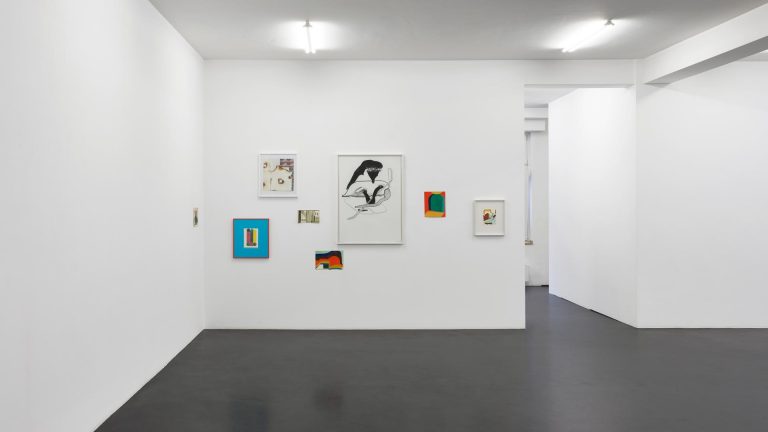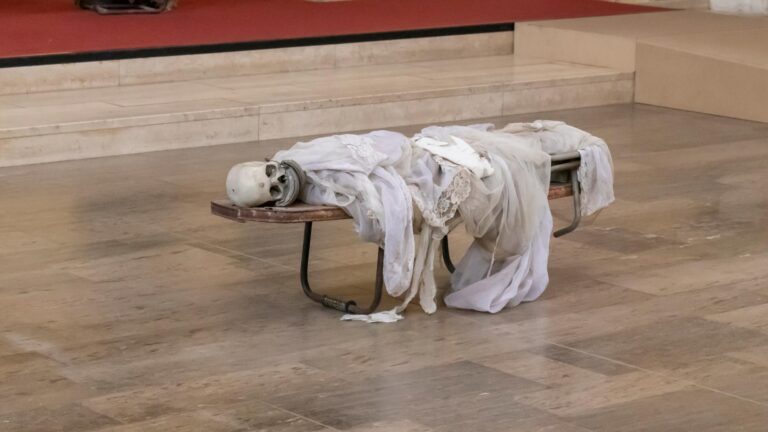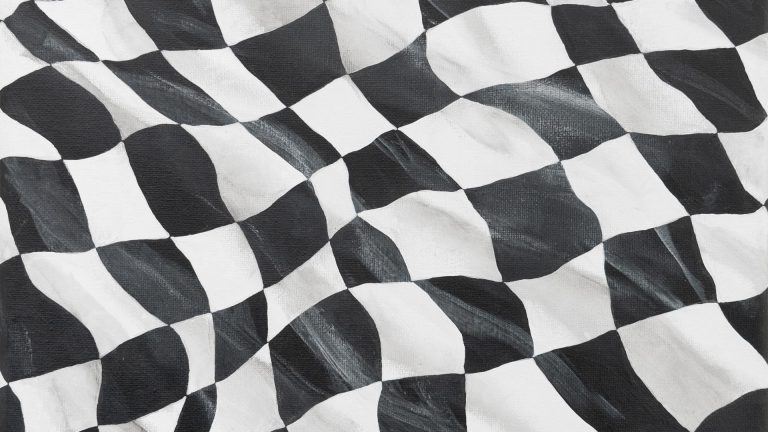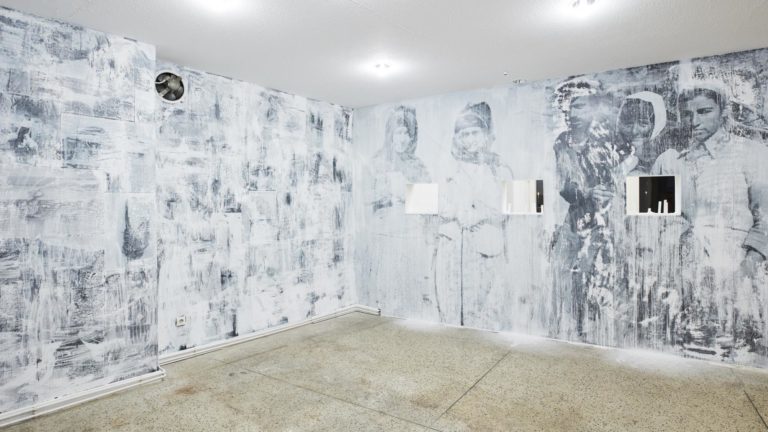Artists: Carlos Amorales, Karel Appel, Marlon de Azambuja, Alessandro Balteo Yazbeck, Lenora de Barros, Willi Baumeister, Pauline Beaudemont, Heinz Butz, Esther Ferrer, Cristina Garrido, Julius Heinemann, Per Kirkeby, Konrad Klapheck, Oliver Laric, Victor Leguy, Sarah Lehnerer, Bruno Moreschi, Eduardo Navarro, Hermann Nitsch, Letícia Parente, Laure Prouvost, Enrique Radigales, Paula Rego, Daniel Steegmann Mangrané, Eduardo Terrazas, Alexi Tsioris, Stefan Vogel
Exhibition title: THE WAY YOU READ A BOOK IS DIFFERENT TO HOW I TELL YOU A STORY
Curated by: Marta Ramos-Yzquierdo
Venue: Jahn und Jahn, Munich, Germany
Date: January 26 – March 10, 2018
Photography: Ulrich Gebert / all images copyright and courtesy of the artists and Jahn und Jahn, Cologne
The exhibition curated by Marta Ramos-Yzquierdo will present a selection of works from Fred Jahn’s gallery archives and library, together with the pieces of about 27 international artists: both guests and artists who work with Fred and Matthias Jahn. The starting point is Gallery Jahn und Jahn’s desire to consider its own history as a way of reflecting how stories are told, the aspects that are omitted, and how a common future can be invented through artistic thinking.
Fred Jahn has four decades of experience working with artists, mainly with the generation of American minimalists and the revived German scene of the 80s. The exhibition is a story about their close relationships as well as his dedication to works on paper and artists’ books as places of experimentation. Meanwhile, Matthias Jahn has re-established his space, opening it up to new generations and dialectics. The union of both, in parallel spaces, therefore becomes an opportunity to offer an active programme based on constant dialogue.
Fred Jahn’s extensive library, which contains about six thousands volumes devoted to 20th century western art and includes the editions he himself produced, is based in the ground floor of the new rooms of Matthias Jahn’s gallery. Books are the foundation and the centre of this new journey. The exhibition starts symbolically in the library space as a reflection on what stories we keep, the stories that have been written and the books that have been selected, but also how they follow different codes; as books to be organized in the shelves, but also as language and words on paper. Books and drawings will create an open dialogue with more recent works, all functioning at the same level of reading.
The 20th century was focused on progress as a goal, and artists posed questions about the value of the modern project through radically rationalist positions, or through the acceptance of inherent human irrationality. These two perspectives will be reflected in works by Karel Appel, Willi Baumeister, Heinz Butz, Per Kirkeby, Konrad Klapheck, Hermann Nitsch, and Paula Rego, alongside catalogues and artists books by Wolfram Erber, Isa Genzken, Imi Knoebel, Barry Le Va, Gerhard Richter, Fred Sandback and Al Taylor.
The exhibition aims to show how these artists started deprogramming those past codes and how this attitude continues with new subjects and strategies in our present moment. The works will create a network of references to analyse these books and their words, but more than this: memory, images, modes of perception and, accordingly, modes of imagining. In other words, through their pieces, the artists investigate the human being both in terms of individual identity and in terms of a social collective body.
After the failure of past utopias, later discourses confirmed these ruins and tried to build something from their fragments, but also went beyond revisionism. Contemporary discourses propose an approach that is open to “the other”: thoughts and philosophes that have been consistently rejected, erased or ignored, and which represent the main issues dealt with in the exhibition. Examined first is our attitude towards the “feminine” as condition and as gaze; secondly, a new approach to nature and new ways of learning from it; next, technology as interface with the world; and finally, the different concepts of time and history that exist simultaneously in different cultures.
Among the works that will stand out in the show is Brazilian artist Letícia Parente´s film Made in Brazil, pioneering for the 70´s, along with the video Extrañeza, desprecio, dolor y un largo etc. [Strangeness, disregard, sorrow and a long etcétera] by Spanish artist Esther Ferrer, and the feminist manifesto Estudo para facadas [Study for stabs] by Lenora de Barro, likewise from Brazil. Pauline Beaudemont will present her latest film, adding a refreshing voice to this feminine gaze.
Carlos Amorales will show a series of scores created for the Mexican Pavilion, one of the most significant contributions to the last Venice Biennale. A system of codes as language will also be present in Julius Heinemann´s drawing book and Laure Prouvost´s installation that confronts image and words.
Nature as a starting point to reflect on new methods and technologies can be found in the works of Daniel Steegmann Mangrané, as well as in works by Eduardo Navarro and Enrique Radigales. Juxtaposed with these, the Austrian artist Oliver Laric will reflect on historical memory, its image and its reproducibility.
Four of the guest artists are developing specific works for the show: Marlon de Azambuja will install a new, site-specific work based on stability and memory; Alessandro Balteo Yazbeck will abstract relationships of power using images that relate to the gallery’s history; Victor Leguy will interfere in the logical order of the library; and Sarah Lehnerer, using her installation and pictures, will propose a second reading of the show, breaking the partial point of view of any subjective process.
*Books by Wolfram Erber; Isa Genzken; Imi Knoebel; Barry Le Va; Gerhard Richter; Fred Sandback; Al Taylor.
Marta Ramos-Yzquierdo is an independent Spanish curator. Her main focus is on analysing the perception of the work of art in society and its consideration as labour. This study started with Artist working, (thinking on) new economies, a report and exhibition about labour conditions within contemporary art, done in collaboration with Ana Leticia Fialho who advised on sociological aspects. Ramos-Yzquierdo is likewise part of History in display (WT), a collaborative project with contemporary artists on critical insertion in Brazilian museums.
THE WAY YOU READ A BOOK IS DIFFERENT TO HOW I TELL YOU A STORY, 2018, exhibition view, Jahn und Jahn, Munich
THE WAY YOU READ A BOOK IS DIFFERENT TO HOW I TELL YOU A STORY, 2018, exhibition view, Jahn und Jahn, Munich
Marlon de Azambuja, Solide und Stabil, 2018
THE WAY YOU READ A BOOK IS DIFFERENT TO HOW I TELL YOU A STORY, 2018, exhibition view, Jahn und Jahn, Munich
Eduardo Terrazas, Possibilities of a Structure: Diagonals 1.3.11, 1975 – 2015
THE WAY YOU READ A BOOK IS DIFFERENT TO HOW I TELL YOU A STORY, 2018, exhibition view, Jahn und Jahn, Munich
Sarah Lehnerer, The Other*, 2018
THE WAY YOU READ A BOOK IS DIFFERENT TO HOW I TELL YOU A STORY, 2018, exhibition view, Jahn und Jahn, Munich
THE WAY YOU READ A BOOK IS DIFFERENT TO HOW I TELL YOU A STORY, 2018, exhibition view, Jahn und Jahn, Munich
Oliver Laric, Life Masks, 2016
THE WAY YOU READ A BOOK IS DIFFERENT TO HOW I TELL YOU A STORY, 2018, exhibition view, Jahn und Jahn, Munich
Alessandro Balteo-Yazbeck, Level, 2017
Alexi Tsioris, Ohne Titel, 2017 – 2018
THE WAY YOU READ A BOOK IS DIFFERENT TO HOW I TELL YOU A STORY, 2018, exhibition view, Jahn und Jahn, Munich
THE WAY YOU READ A BOOK IS DIFFERENT TO HOW I TELL YOU A STORY, 2018, exhibition view, Jahn und Jahn, Munich
Stefan Vogel, Denn so läuft’s normalerweise, 2018
THE WAY YOU READ A BOOK IS DIFFERENT TO HOW I TELL YOU A STORY, 2018, exhibition view, Jahn und Jahn, Munich
THE WAY YOU READ A BOOK IS DIFFERENT TO HOW I TELL YOU A STORY, 2018, exhibition view, Jahn und Jahn, Munich
Eduardo Navarro, The origin of the origin of the origin of the Universe, 2017
THE WAY YOU READ A BOOK IS DIFFERENT TO HOW I TELL YOU A STORY, 2018, exhibition view, Jahn und Jahn, Munich
Pauline Beaudemont, Originale, 2018
THE WAY YOU READ A BOOK IS DIFFERENT TO HOW I TELL YOU A STORY, 2018, exhibition view, Jahn und Jahn, Munich
Julius Heinemann, Chronos & Kairos, 2017 – 2018
THE WAY YOU READ A BOOK IS DIFFERENT TO HOW I TELL YOU A STORY, 2018, exhibition view, Jahn und Jahn, Munich
No Name, Heinz Butz (BUTH/P 66) Ohne Titel, 1995
THE WAY YOU READ A BOOK IS DIFFERENT TO HOW I TELL YOU A STORY, 2018, exhibition view, Jahn und Jahn, Munich
No Name, Heinz Butz (BUTH/P 138) Ohne Titel, 2007 – 2008
THE WAY YOU READ A BOOK IS DIFFERENT TO HOW I TELL YOU A STORY, 2018, exhibition view, Jahn und Jahn, Munich
Daniel Steegmann Mangrane, Ubà, 2015
Carlos Amorales, Ohne Titel, 2018
Laure Prouvost, Reliques This Was Found, 2013
THE WAY YOU READ A BOOK IS DIFFERENT TO HOW I TELL YOU A STORY, 2018, exhibition view, Jahn und Jahn, Munich
THE WAY YOU READ A BOOK IS DIFFERENT TO HOW I TELL YOU A STORY, 2018, exhibition view, Jahn und Jahn, Munich







































